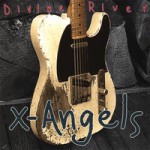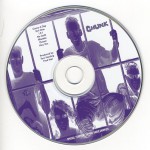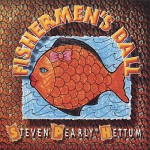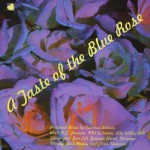 X-Angels
X-Angels
Divine River
Sunset Record Company
It’s been a couple of years since the Cowboy Angels’ last album, X-Blonde. In that time, keyboardist Kenny Day has left the fold and the band has changed its name to X-Angels. The former name always had a Nashville ring to it that never truly fit crime dog Tom McGriff’s gruff, characteristically Dylanesque vocal delivery of hardscrabble rock songs.
The name change reflects a few slight stylistic alterations (although on a couple of tracks they sound more “country” than ever— incorporating a mandolin on a couple of tunes; and nearly Byrds-like on others, with electric twelve-string chiming), the most obvious of which is that, for the most part, McGriff has ditched the Dylan routine on his vocals.
Now opting for a gravelly vocal technique somewhere in the neighborhood of John Hiatt, Elvis Costello or Graham Parker, McGriff has allowed himself a wider range of influences from which to draw, affording him a more honest presentational stance. The band seems much better integrated into a divergent whole, which, after two years, would be expected for a group consisting of such high-caliber musicians.
The rhythm section, veteran drummer Tom Royer and bassist Rich Gooch, whose exploits in the annals of Portland rock history are legendary, never fail to create a solid foundation for McGriff’s jangling acoustic and electric rhythm guitars and Steve James’ expert lead guitar support. James honed his chops with Skinhorse before joining the Angels, and before that spent a long stint backing Jerry Joseph in Little Women.
So it is not a huge musical leap for Steve to accompany McGriff (whose approach is similar to that of Joseph), but more akin to donning a coat that has grown more comfortable and attractive as it has aged. James’ solos are always well-paced and soulful, utilizing a colorful palette of tones and textures without losing touch of dynamics or definition. In addition, his more gentle lead-vocal presence is a pleasant balance against McGriff’s raw throated expectorations.
Of the dozen songs presented here, McGriff wrote seven and James three. James’ contributions result in a little softer, poppier sound, while McGriff’s tunes are usually grittier slices of life, with bluesy overtones. The album kicks off with “Someone You Can Trust,” McGriff’s chunky ode to interpersonal paranoia; layers of acoustic and electric guitars are buttressed by James simple single note guitar lines, built around the chord progression. The band’s take on sparky Mark Spangler’s “Great Vibration” is an excellent opportunity for the band to explore a Little Featish shuffle, tossing a bit of swagger and strut into their stride.
McGriff’s “At The Back Window” benefits from superb instrumental tension in the verses and a funky, Archie Bell and the Drells guitar riff in the chorus. “Come A Day” is an alt/country ditty, replete with mandolin flourishes and a downhome twang. James livens things up with a fiery Leslie-flavored solo. James tosses a roiling mandolin onto “Banks Of The River,” McGriff’s sole Dylan portrayal on this outing: here, circa Slow Train Coming-period stuff, anchored by Gooch’s stolidly adipose bass punctuations. McGriff contributes a timely harmonica solo (what else?) against a familiar folk progression. Lilly Wilde lends a gospel touch with her multi-tracked background chorus.
Another mandolin fueled number, the traditional “Oh, The Wind And Rain” finds James in the lead vocal role, his halting tenor calling to mind Roger McGuinn. James also performs the lead vocal chores on “Swirl,” an Eagles-ish piece of work with a chorus reminiscent of “Already Gone,” right down to the sweet three-part vocal harmonies.
McGriff’s most successful “singles” are the electric-twelve string inflected “That’s What Friends Are For,” which lyrically seems to offer the other, more optimistic side of the coin flipped on “Someone You Can Trust.” James launches the snide “I’ve Got News For You” with a ballsy slide guitar figure, fueled by Royer’s cannon fire snare shots and McGriff’s gasoline-laced vocal. A winner.
James’ shining moment lights in “Little Cowboy Girl,” an icy paean to a barroom queen, inlaid with weeping lead guitar filigrees and soaring lap steel flourishes. Very nice, And the Byrdsian “Only A Dream” flies upon shimmering electric twelve string wings and Steve’s McGuinishly terse vocals— gleefully gliding upon a buoyant beat; opulent harmonies glistening in the choruses.
By letting go, somewhat, of the reins of Cowboy Angels, Tom McGriff has empowered the band, permitting the members to confer their best energies and efforts towards growth and unity. The result is that X-Angels display far more versatility than in their previous incarnation, more musical diversity and lyrical equilibrium; offering a broader scope and more distinct focus. This is a fine endeavor from start to finish.
 10 Dollar Mic
10 Dollar Mic
Rising Sun
Self-Produced
Following in the footsteps of their predecessors fellow Mid-Valley counterparts, Crazy Eights and Cherry Poppin’ Daddies, 10 Dollar Mic mine horn-fused ska rhythms with wit and dash, plumbing intricate charts with smart dexterity. Five of the guys chip in reed and brass parts, two share the bass assignment, three step up to the vocal mic. The duties are seemingly performed by committee. For that reason, the recording has a certain anonymity about it, that does not detract entirely from the creation overall impression that a sonic party is in serious progress.
The lyrical subject matter set forth by the guys: trumpeter Benji The Hunted; drummer Zakk Maxxum; saxman Paul; keyboardist and occasional bassist Young Dave; bassist, part-time guitarist and one-time vocalist Drome, trombonist Shawshank and his fellow bone man, intermittent vocalist Drew, and primary “songwriter,” vocalist, guitarist and tenor saxman E-Luva— seems to revolve fundamentally around the ingestion of alcohol or other inebrients (such as the opposite sex), with ersatz spy and superhero themes sprinkled against the sinuous, horn-driven instrumental pieces.
And, as it stands, it is the instrumental aspect of the band that is its raison d’être. But, for a young band, that is as good a point of embarkation as any. Vibrant, big band horns dominate the Latin flavored swing/ska of “Kitty” with Reel Big Fish, perhaps serving as the inspiration. “Infiltration” probes a TV informed world of espionage against a nifty guitar lick that skitters menacingly against percolating organ and sputtering horn charts. “Shadowman” would be the superhero theme in question that all the same allows for some impressive solo work among the horn players and playful Beastie-like gang cheers. “Drinking Again” pretty much describes itself, sounding something like Tom Waits fronting a ska version of the Pogues. Eegad!
“Skadzilla” and “Rising Sun” dispense with the conventions of lyrics and vocals altogether— which is probably just as well, considering the attempts at poetic contrivance mentioned heretofore: instead picking the meat from the barest bones of song structures, positing plump morsels of solo bits across the terrain of both arrangements.
10 Dollar Mic are a band of hot instrumentalists in desperate need of a vocalist with a lyrical direction, along the lines of a political satirist such as Todd Duncan or a Cab Calloway-worshipping sociopath of the nature of Steve Perry. Left to their own devices, the Mics are perfectly capable of extemporizing in an enterprising and entertaining fashion, with energy and good humor abounding. It’s just that, lyrically, they have absolutely nothing to say, and vocally, they have no one to say it.
 Chunk
Chunk
Chunk
Self-Produced
It was May of 1996 when Glass Chunk released their first opus. World Without End was a mixed-bag of Styxish art rock and mostly misdirected artistic pretensions primarily promulgated in the highly mannered stylizations of lead vocalist Tony Mandella. Mandella’s songwriting partner guitarist Calvin Baty was the grounding force. Now, two and a half years later, Mandella and Baty are back with a new rhythm section and a new, slimmed down name: Chunk.
And, with the aid of former Beach Boy liaison Fred Vail and veteran Nashville producer/engineer Tom Harding, Chunk have managed to accomplish with their second album what two years ago seemed unimaginable— they have created a powerful collection of superbly crafted songs, playing them flawlessly, with the sort of authority that simply did not appear to be within their reach, ever. Either Vail and Harding are some kind of miracle workers, or Mandella and Baty did a lot of work on themselves as artisans and performers, and as human beings.
Whatever the case, this is a fine record, chockful of memorable melodies and thoughtful lyrics that have actual meaning and a real point of view. Mandella still can sound like Styx’ Dennis De Young at times, but for the most part he controls that impulse; tempering his acute tenor and penchant for histrionics. For his part, Baty has whetted his chops substantially, lending each of the seven songs captured here a distinctive instrumental mood and atmosphere. The new rhythm section, bassist Brian McMillen and drummer Jason Dunne fit like a piston inside a well-machined cylinder.
“Come A Day” revolves around Baty’s slashing riffage and bubbling wah-wah and guest Doug Sizemore’s fiery organ work. One of the hits of the set is the sprightly “Evil One,” a Jellyfishian pop tune of the highest order. Here Mandella proves his mettle with a vibrant vocal effort. Sizemore again adds subtle keyboard flashes to the mix. Another winning cut is “IEI.” Over a plaintive REMish guitar figure, Mandella’s mostly unaffected and heartfelt vocals fly over a soft cloud of harmonies on the memorable chorus.
A terrific chorus and tight three-part harmonies drive “No Guilt,” another tune with serious radio worthiness. “Dream” skips upon Baty’s crunchy four-chord metal guitar and Mandella’s constricted vocal lines in the verses, playing against the delicacy of the turnarounds. “Hey You” beats home the point that Mandella and Baty have become adept at constructing splendidly infectious rock songs that bear enough originality to sound new and exciting.
Most bands tend to throw their lot together for a few years, attempting to disguise their deficiencies, which is usually the fatal flaw within the organization that leads to its eventual downfall. Calvin Baty and Tony Mandella have made the concerted effort necessary to learn the art of writing quality songs. This could not have been predicted a few years ago. But Chunk have succeeded where most fail. They have learned their lessons with open minds and determined hearts. And for their dogged intrepidity they will reap the rewards, As Chuck Berry once said, it goes to show you never can tell.
 Steven “Pearly” Hettum
Steven “Pearly” Hettum
Fisherman’s Ball
Locals Only Recordings
An all-star ensemble gathers to back up Hettum, longtime member of the local music community, dating back to his days as manager of Billy Rancher and the Unreal Gods, through subsequent years as an erstwhile songwriter and folk troubadour. Billy Kennedy, Neil Gilpin, Lew Jones, Michael Kearsey, Robbie Laws, Mike Danner, John Lindahl, David Diaz, Lex Browning and Dennis Elmer join in on the dozen songs, making of each a tiny gem.
Hettum’s is an easy, homespun demeanor. His songs sound entirely familiar, many of them are derived from traditional sources, as well as from other influences such as Hank Williams country, Texas swing, Carl Perkins rock and Garth Brooks/ Clint Black-style cornpone. The title track is a rousing ration of crawfish pie and filet gumbo. Slide guitars, violin and accordion vie with several other acoustic and electric guitars. A foot-stomping hoedown.
Steve vibrates like Johnny Cash and coos like Elvis on “Bar Girls,” a tune he co-wrote with Rancher, way back when. “Sweet Messalina” echoes of Ray Wylie Hubbard’s “Redneck Mother,” the Rolling Stones’ “Honky Tonk Women” and Merle Haggard’s “Okie From Muskogee” while sounding like a Jimmy Buffet tale of some sort. “Fishin’ with Gene” is exactly what one would expect a song with that title to be.
Combining elements of the Kingston Trio’s “Tom Dooley” and the traditional instrumental “Wildwood Flower,” “Lookin’ Out My Window” sounds as authentic as its models. “Travelin’ Song” shares a few things in common with the King’s “That’s Alright Mama.” “Food For Love” is a sideways version of Williams’ “Hey, Goodlookin.'” Hettum’s rendition of “The Clouds may Hide The Moon” receives a sparse arrangement of acoustic guitar, piano and a vocal, but produces a palpable tension all the same. Very nice.
Steve Hettum is probably not going to win any awards for originality. But the musicianship is so superb and the intentions are so good, that in some strange way the record is even more appealing for its utter and complete familiarity. It’s the kind of album you’d want to play on a rainy Sunday afternoon, with a fire blazing in the fireplace; a snifter of brandy warming on the coffee table.
 Various Artists
Various Artists
A Taste Of The Blue Rose
Flying Heart Records
What a wonderful project this is! Nine different artists, from the likes of Chris Newman, Lily Wilde, Mel Solomon, Rich Halley, Johnny Ward and Bob Shoemaker to comparative unknowns, such as Norman Moody and O. C. Thomas contribute a track or two each to this great local blues compilation. Producer Jan Celt has navigated his Flying Heart label through stormy seas and calm waters, but it is a testament to his stature as a warm and personable human being that he was able to achieve the masterstroke of having drummer Carlton Jackson, pianist Janice Scroggins and bassist Randy Monroe serve as the “house band” for the performers.
Joined on occasion by organ wiz Dover Weinberg and peripatetic saxmaster Gary Harris, as well as stand-in bassist Albert Reda, the backing musicians act to forge uniform quality to the various presentations, which vary from the authentic Delta blues of O. C. Thomas to the hot swing of Lily Wilde and the be-bop informed charts of saxman Hally and everything in between.
Carlton Jackson is a standout, serving up adept and sensitive drumwork. And Scroggins is the very model of the perfect side musician, utilizing space in her keyboard delivery, leaving plenty room for the other players, while glistening in her moments to shine. The musical roster includes a long list of guest performers, typically brought in for a single session, or maybe two. All musicians, regardless of their stylistic persuasions, would do well to pay close attention to the way Jackson and Scroggins interact with their counterparts. It is a true clinic, with invaluable lessons at every turn.
O. C. Taylor’s rendition of Muddy Waters’ “Two Trains Runnin'” is purported to be his first recording. According to the liner notes, he “came to Portland in the 1940s from rural Mississippi and likes to play his Truetone guitar in his garage.” That historic legacy is captured here with a spirit of genuine accuracy. Wilde’s two entries are swinging numbers. Her take on Helen Hume’s “Be Baba Leba” is faithful, but Lily’s vocal prowess is second to none. Her earthy version of “Don’t Shout At Me Daddy” accents the sultry aspects of her dusky contralto.
Mel Solomon’s two offerings are notable for the fact that they apparently represent rare appearances for him at the lead vocal mic. He steers through “Further On Up The Road” with assured gusto. And his reading of Bobby “Blue” Bland’s “Mother-In-Law Blues” benefits from a new young guitarslinging sensation on the scene, one Jesse Schmunk. Schmunk plays with ingenuous authority and sophistication, belying his youth and comparative inexperience. Schmunk also surfaces on Norman Moody’s “Bad Luck Neighborhood,” demonstrating versatility and a superior touch in his solo. For his part, Moody exhibits a mutedly sullen personae that suits his edgy, quirky voice.
Producer Celt turns frontman on a sprightly cover of the Bonzo Dog Band’s “Humanoid Boogie.” Funky rhythms are fortified by Scroggins’ fiery electric piano solo. And Jan’s instrumental tribute to Paulette Davis, who died recently in a tragic auto accident, is a tender nocturne that features some very classy guitar work by the Chuxter himself, covering six minutes of classic blues terrain with clean, smoldering Roy Buchanan-like licks that are as inventive as they are heartfelt.
Perhaps the most affecting moment comes with Chris Newman’s poignant “Sorry For Myself.” Ostensibly, Chris and his wife are currently homeless and living in a cardboard shack in Forest Park. As destitute as those circumstances might seem, Chris has never been more focused as a singer or a songwriter. “The bridges I have burned/Make it hard to turn myself around/There’s nothing I have learned/My hopes dashed to the ground/I’m sorry for myself/I’m sorry for my ways/I can’t blame no one else/Lost nights and wasted days.” Not since Love’s tragic “Signed DC” has a more stark portrait been drawn. One hopes that Chris can get his situation together soon, the local music community needs his talent. One would also hope that the local music community will come to Chris’ aid and lift him out of his present dreary circumstances. it seems the l;east that could be done for a twenty year veteran of the local scene.
No other collection in recent memory has rendered such a positive message, nor such a succinct overview of the diverse tendrils that spring from blues roots. It is Jan Celt’s profound sense of unity, community and fraternity that is the prime motivational force behind this undertaking. And it is the measure of his humanity that he has succeeded so grandly here.
